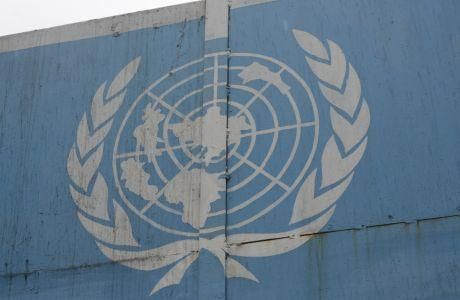Peacebuilding is a problem, at least as a word. It's an awkward compound noun, more a linguistic aspiration than the clear denotation of an idea, and its wobbly claim on language betrays weak conceptual roots. The simple fact is that, for all the talk about peacebuilding, no one really knows what it is.
That makes the United Nations Peacebuilding Commission (PBC) either a daring risk or an ill-conceived whimsy—or both. Some of it appears to work. Much of it doesn't. There's a good deal to be learned from the failures and success of the PBC, but there's also a bigger point: For all of even its outright blunders, this may be exactly what we want from our United Nations.
The PBC is an intergovernmental body orbiting UN Headquarters in New York. It has 31 members, drawn from the member states of the United Nations. It advises the Security Council and its ancillary architecture—a Peacebuilding Fund (PBF) and a Peacebuilding Support Office (PBSO), with its own assistant secretary-general—and gives the UN secretary-general leeway to take direct action on peacebuilding matters. Ban Ki-moon thinks convening a political dialogue is key to stopping a spiral of political violence in Sierra Leone? Send $1 million to Freetown, done.
The infrastructure of support that comes from these three interconnected peacebuilding bodies is complicated, but the point is to be flexible. The UN's peacebuilding projects are supposed to be "quick win" interventions intended to catalyze donor interest in unsexy sectors and respond to sudden developments. It is, as many have pointed out to me, risk tolerant. The peacebuilding infrastructure is designed to do what the rest of the United Nations so often fails at: being relevant, responsive, and adaptable.
What interested me as a journalist is whether the infrastructure works.
When I set out for the four inaugural countries of the commission's first five-year agenda, I thought I'd take several common hypotheses from the literature about creating sustainable peace and see how they fared in each of the four countries. The trouble is, the PBC agenda is a poor taxonomy. Sierra Leone, Burundi, the Central African Republic, and Guinea Bissau—the PBC's first four countries—have only the broadest characteristics in common. They're all in Africa, on the top of failed states lists, and the bottom of the Human Development Index. They all had war, and they all want peace. And that's about it.
Meanwhile, there's barely a consensus on the meaning of the word itself. It's fair to say there's a notion that peacebuilding hovers somewhere between peacekeeping and development, but every person I asked to define it gave me a different answer. Some people, in the field and in New York, insisted that differentiating between peacebuilding, state building, and development was passé. Others said it was critical. Some refused to get caught up in questions of sequencing; others insisted sequencing was precisely the point. Some inveighed against peacekeepers peacebuilding; others insisted it should be required.
The conceptual confusion, unsurprisingly, creates some difficulties on the ground, particularly when cash is on the table. There's confusion, there's institutional infighting, there's sometimes outright hostility between organizations the money is supposed to bring together as partners.
But there's also creativity. In Guinea Bissau, 250 young people wrote business plans; the best of them were awarded micro-finance grants, and they got their first payments in July. In Sierra Leone, a quick grant from the PBF made it possible to negotiate an end to a violent standoff between the country's two biggest political parties. In the Central African Republic (CAR), peacebuilding money trained journalists for the first radio station in Paoua, a small town a 12-hour drive from the capital, in the heart of rebel-held territory.
In fact, Paoua's would-be radio station illustrates the real problem with peacebuilding. It's not the fuzziness of the concept or the novelty of the infrastructure. It's old-fashioned politics.
The radio project is pitch-perfect, on paper. It's a three-way partnership between the national government, the people of Paoua, and the United Nations—the epitome of "local ownership" that all peacebuilding projects seek to achieve. The community donated the building, volunteered their labor, and raised money for paint and a new roof. The United Nations trained the journalists and technicians and promised to give them equipment. And the government of the CAR agreed to outfit the station with a $2,000 antenna.
The antenna never showed up. The journalists haven't touched a recorder or a soundboard in months; some are looking for new work. The government says it has the antenna but can't get it up to Paoua. UN staff say the CAR isn't exactly that reliable when it comes to coughing up the cash.
Some people suggested to me that peacebuilding projects, like the wars that came before them, are largely about the symptoms of a dysfunctional political economy: unemployment and hunger, poor health care, crumbling roads, dirty water. Aid and development also try to treat these symptoms, but UN workers in Sierra Leone suggest that getting actively engaged with the political system may help the PBC deal with the much tougher underlying problem—making that system work. It's an approach riddled with risk, but the PBC is, perhaps, the place for that.
That's a problem that has bedeviled world politics, from development to diplomacy, since long before the PBC. It would be a tall order to expect the PBC to suddenly solve the problem. But the fact it's there at all opens institutional and political space within which to try different tools, and if they don't work, to try them again. If the commission stays as aspirational as the process it's named after, that may just be the right approach.



